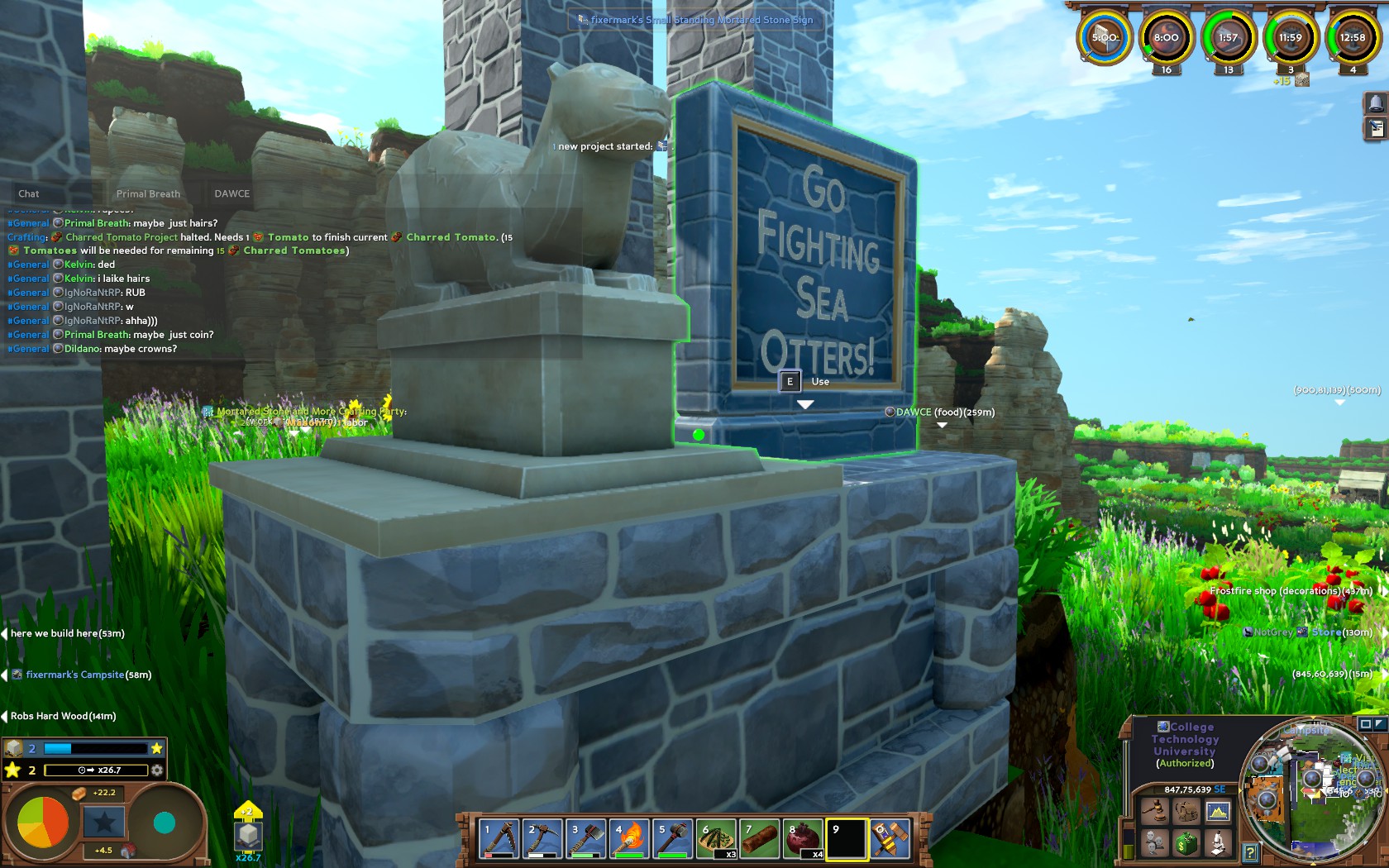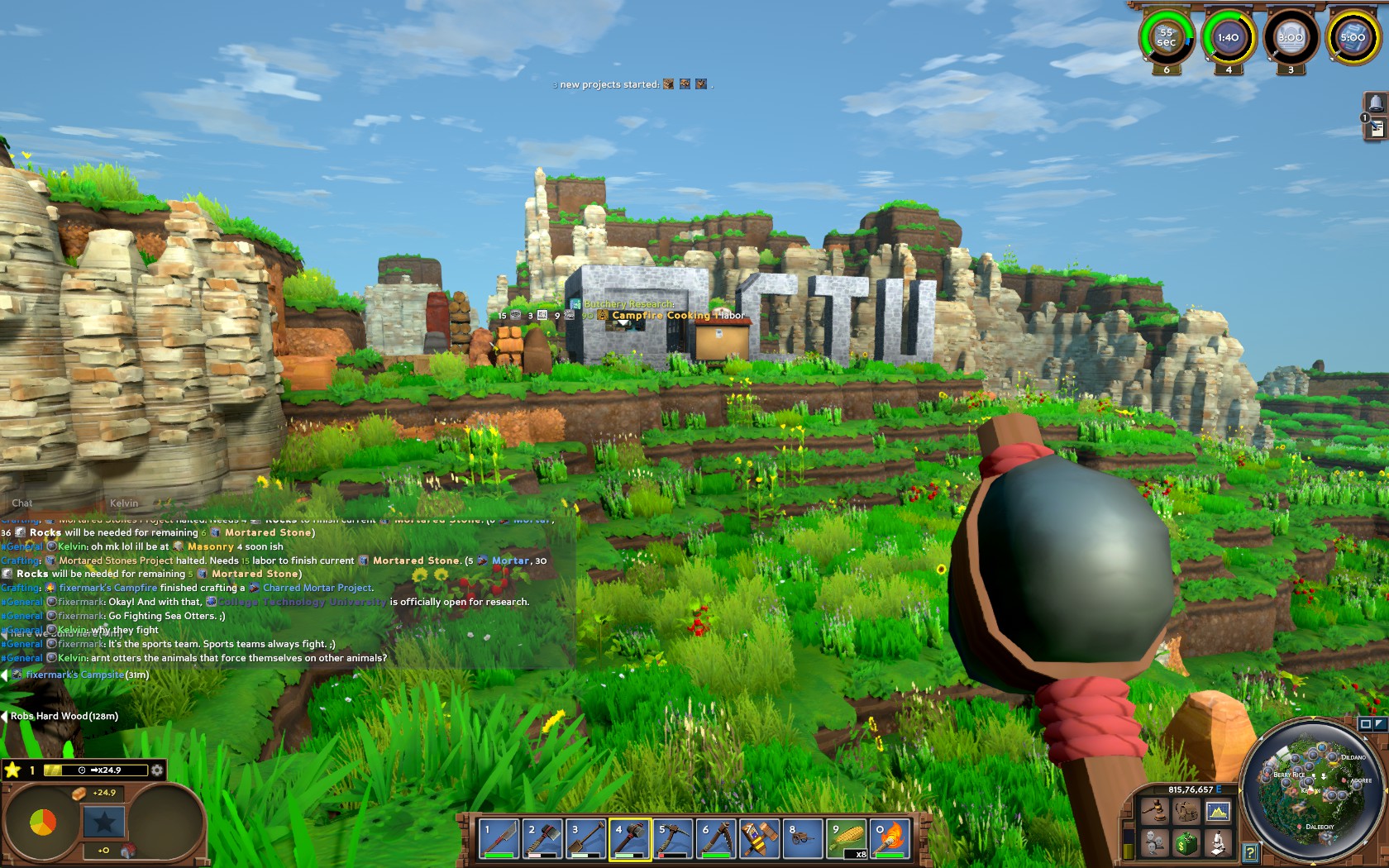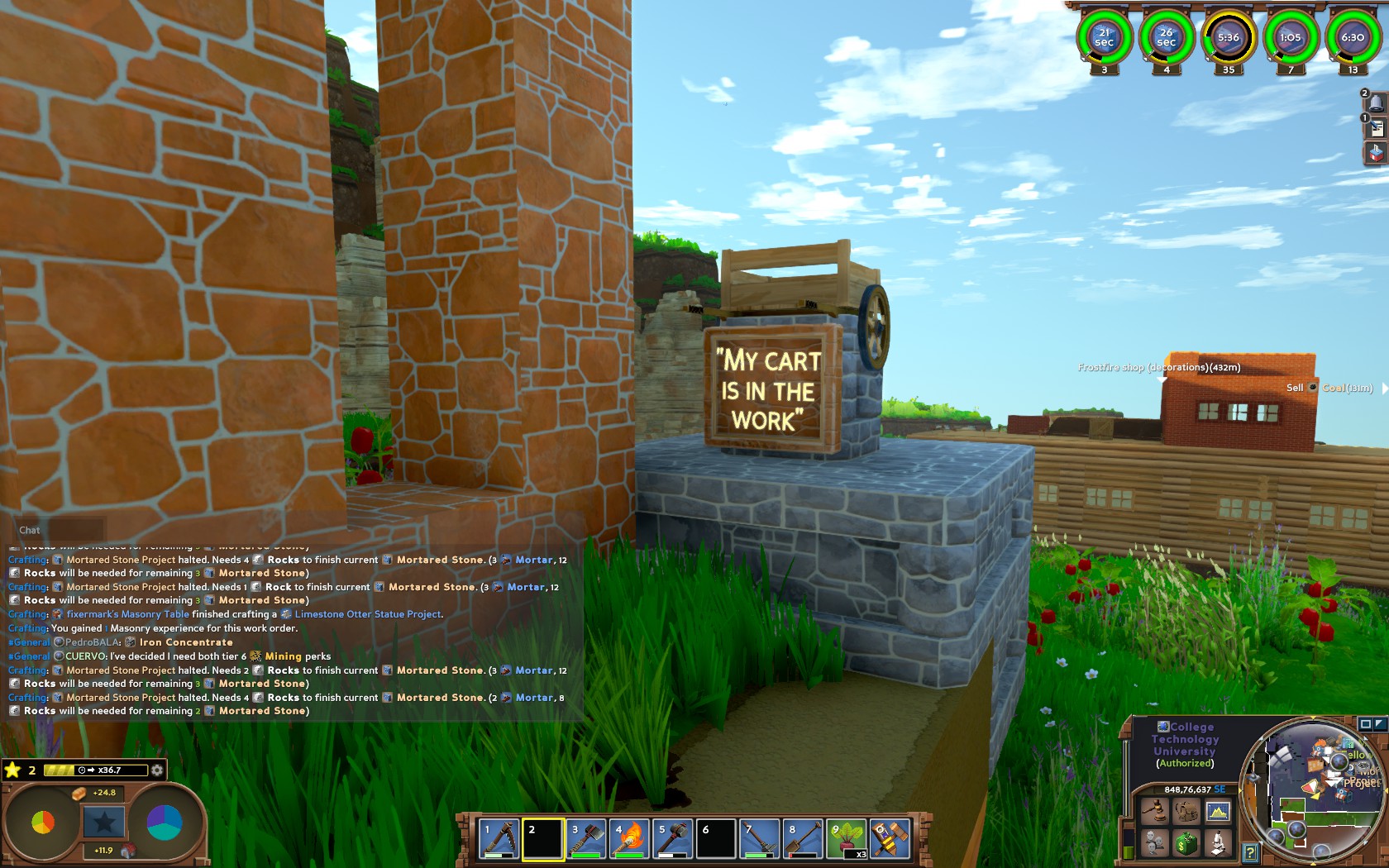The Story of CTU - when I made a fake college in a video game
Eco is an interesting Minecraft-esque game where a society gathers together to try and build a community from a hunter-gatherer lifestyle to a modern town, through crafting, trade, and politics. Also, there’s a meteor that is going to destroy everything in twenty days unless you stop it.

“Don’t mind me, pretend I’m not even here.”
The game has a few twists on the Minecraft style. For starters, your player can only do things they have the skills to do. Skills are unlocked via a two-step process:
- (For most skills, except the starters) Read a skill scroll to teach you the necessary skill. Skill scrolls come from a skill book, which a player can create by spending a massive amount of resources on researching the skill; once they have the book, it can be used to create unlimited scrolls and they can sell them, give them away, hoard them, etc.
- Invest one skill point in the skill. Skill points are accrued in real time as a function of how well-fed you are and how cool your house is.
The game also includes a simple economy: starting from a decentalized system where each player has their own infinite supply of personal “credits” that they can use to buy and sell at their own store, but one person’s credits aren’t spendable at another person’s store. Fungible currency comes into existence when someone builds a mint and makes a currency.
The first round I played ended early when the operator of the server got bored and stopped running it. My second round, I started late in a session and took the opportunity to learn the game mechanics, setting myself up with a small workshop nestled in a hillside. The rest of the players had a handle on the meteor, so I contented myself with building car parts and a little light logging.
But I hit upon an idea for my third playthrough, where I’d start from the beginning: I was going to learn every skill. And I was going to do it by getting people to give me their books and the resources to research books.
… and I was going to do that, by being a college

Playing the game of playing the game
I started out by using my first couple skill points to unlock some useful basic skills: mining and masonry. One makes it easier to haul stone and the other turns that stone into buildings. With those two in play, I set up a small structure with a couple of research tables and a store. But more important than the building: masonry lets a player build signs, and colleges need lots of signs (more on that later). I had to decide on a name for the institution, so I went with something as nondescript as possible. Thus was born College Technology University.

It doesn’t look like much right now. But soon… It will continue to not look like much. Such is the life of the poor academic.
With the basic components established, I announced myself and my premise to the server via global chat. The plan was simple: my store would buy things with my infinite credits. It would sell skill scrolls for free. Any skill books in my possession, I would keep a healthy stock of skill scrolls available. By this approach, I would consolidate research and make it freely available. Taking a page from my home town, I declared my intent above the store.

Animals pay cash.
These pieces alone, I did not anticipate would pull people in. So I sweetened the deal a bit with a simple incentive: since donations were paid from my infinite pool of personal credits, but I provided no way to spend those credits, the credits became a simple debt ledger of who had donated how much to the school.
And as any academic institution knows, donor lists have power.

If there’s one thing gamers love, it’s being at the top of a high score board
With these pieces in play, the game began: could I get a copy of every skill book in the game (and in so doing, have my player read every scroll) via coordination, a donor board, and roleplay alone?
My premise established, I began role-playing the dean of College Technology University, a mixture of earnestly helpful and chronically underfunded. For every skill we unlocked, I put on my best Sally Struthers voice and announced it to the world. I got positive feedback on that; players started mentioning they looked forward to my fake ads for the various skills.

TV / VCR repair, child daycare, computer programming…
Giving scrolls away for free worked better than I’d hoped. I feared someone would try to attack the system by draining the supply of scrolls, but in practice that only happened one time: one of the players in the nascent government, in an attempt to incentivize creation of one of the key skills, put out a bounty on scrolls for that skill but forgot to set a purchase limit of only one scroll. An enterprising player cleaned out the University’s supply of that skill to sell unlimited copies of it, and I ended up having to halt production of that scroll until the economic imbalance could be fixed. Players seemed to rapidly learn as a result that buying scrolls was a fool’s errand because the University would be giving them away for free at some point.
More on that government later.
With surplus resources for research came a few that couldn’t really be fit into the research projects themselves, so I repurposed them into expanding the college. Lots of excess building materials, coupled with my mortaring skill, meant I had the resources for some furniture…

… and some statues…

And my work is, often, in this cart
… and what college would be complete without some stuff dedicated to memorable people?

And it doesn’t get much more memorable than him.
At this point, I had a pretty solid routine going: log in, contribute a bit to the research I had in progress, check for / beg for donations, and update the board from my personal account tracker. Once a player became planetary governor and established “Crowns” as a currency, I set up a “Book Shop” to buy and sell in them but kept the donation shop on my personal credit account.

The experiment started to pan out. In about five days, we had every Tier 1 skill in the collection and were working on a handful of Tier 2 technologies, with an eye towards some of the higher-tier technologies (such as Advanced Masonry, for extra-fancy buildings). Things went smoothly after that.
… Or they would have, if a nation hadn’t risen up in the desert, the government hadn’t tried to impose itself upon them, and that government and the economy hadn’t collapsed as a result.
Join me for part 2 next week.









